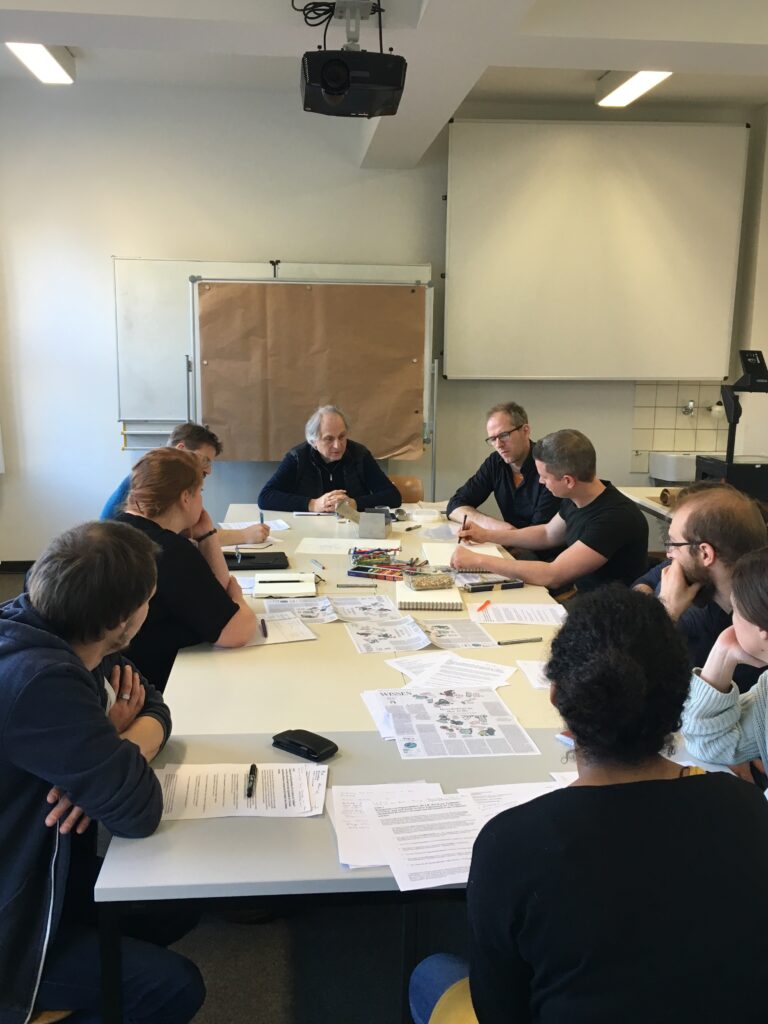Joint PhD Summer School with Instituto Gulbenkian de Ciência
Host-Microbe Symbioses:
From genetics to metabolic interactions
Instituto Gulbenkian de Ciência
- 14 – 26 July 2019
- Applications are open until 20 March 2019
Course Organizers :
- Martin Blaser
(Rutgers University, USA)
Resident microbes and the ecology of human diseases - Thomas Bosch (Kiel University, Germany)
Evolution and the ecology of development - Margaret McFall-Ngai (University of Hawaii-Manoa, USA)
Invertebrate-microbe symbiotic interactions - Luis Teixeira (Instituto Gulbenkian de Ciência)
Host-microbe interactions - Karina Xavier (Instituto Gulbenkian de Ciência, Portugal)
Bacterial Signalling
IGC Symbioses 2019:
This Summer School is designed for PhD students interested in host-microbe symbioses to acquire an in depth understanding of the field from diverse perspectives through the interaction with leaders in the field. These include researchers using different model systems, and levels of analysis from molecular biology, to ecology and evolution. The Summer School will have an emphasis on functionally understanding these symbioses, including a focus on metabolic interactions. The students will acquire knowledge critical for their future choice of research direction.
Animals and plants interact with large numbers of diverse microbes. These symbionts strongly influence many different aspects of host development, physiology and evolution. This is an actively expanding field of research in biology and medicine and there is a current need to summarize and integrate the knowledge that is being generated in order to extrapolate general principles and determine important future lines of research.
The Summer School will be two weeks long, with 19 lecturers, and 35 PhD students. These conditions foster a continuous and strong interaction between faculty and students. The programme includes lectures and the development of a short written research project. This exercise promotes thinking deeply about the questions and future directions in the field.
The course is organized by the Instituto Gulbenkian de Ciência (IGC), Portugal, and co-organized by the Metaorganisms Collaborative Research Center in Kiel, Germany, and the Biology at the Host Microbe Interface PhD Program, Portugal. These institutions have a strong background in postgraduate studies and research on host-microbe symbioses and uniquely prepared to organize this innovative and high-quality Summer School.
Main Topics of the course
The host-microbe symbioses field is clearly moving towards a causal understanding of these interactions. This has been possible through a multi-disciplinary approach and the integration of different research areas. By manipulating the microbiota composition, the importance of specific bacteria or the balance between different bacteria has been established in many instances. Moreover, these interactions start to be understood at the functional molecular level.
In this course an emphasis will be given to recent advances in the functional understanding of symbioses. We will have a particular focus on chemical sensing, metabolomics of the host and their symbionts, and high spatial resolution required to monitor these microbial-host interactions. Participants will be exposed to leaders in the field with different expertise and experience in studying symbioses from many different angles.
The course will consist of general lectures, research seminars and organized working discussion groups. Lectures will cover the state of the art in specific areas of the field and will give the students a broad view of that area. Lecturers will also present their own research on these topics giving the students insight on how specific problems are currently addressed. Finally, students will develop a research proposal throughout the two weeks. Students will identify important questions in the field and propose a research project to address them. The work will be based on literature research and daily discussions with the lecturers.
Audience
The Summer School will be targeted at second or later years PhD students. Participants are limited to 35 students.
Confirmed Lecturers
- Martin Blaser (Rutgers University, New Brunswick, USA)
- Amanda Birmingham (University of California San Diego, USA)
- Melanie Blokesch (École Polytechnique Fédérale de Lausanne, Switzerland)
- Thomas Bosch (Kiel University and Metaorganisms CRC, Germany)
- Jocelyne Demengeot (Instituto Gulbenkian de Ciência, Portugal)
- Maria Gloria Dominguez-Bello (Rutgers University, New Brunswick, USA)
- Joël Doré (Micalis Institute, INRA, France)
- Isabel Gordo (Instituto Gulbenkian de Ciência, Portugal)
- Adriano Henriques (Instituto de Tecnologia Química e Biológica, Universidade Nova, Portugal)
- Jonathan Howard (Instituto Gulbenkian de Ciência, Portugal)
- Rob Knight (University of California San Diego, USA)
- Margaret McFall-Ngai (Pacific Biosciences Research Center, University of Hawaii, USA)
- Anders Meibom (École Polytechnique Fédérale de Lausanne, Switzerland)
- Ned Ruby (Pacific Biosciences Research Center, University of Hawaii, USA)
- Hinrich Schulenburg (Kiel University and Metaorganisms CRC, Germany)
- Paul Schulze-Lefert (Max Planck Institute for Plant Breeding Research, Germany)
- Miguel Soares (Instituto Gulbenkian de Ciência, Portugal)
- Luis Teixeira (Instituto Gulbenkian de Ciência, Portugal)
- Karina Xavier (Instituto Gulbenkian de Ciência, Portugal)
APPLICATIONS
Applications are open until March 20, 2019
To apply send an email with a single pdf file to Symbioses2019@igc.gulbenkian.pt
Application documents – Applicants should submit a letter (one page) explaining why they want to participate in the course, CV (two page max.), a letter of reference from the PhD supervisor (one page), and the registration form.
We are committed to admitting talented students from diverse backgrounds.
Accepted applicants will have to pay a registration fee of 700 Euros. Registration will include lodging and meals. Housing will be at Hotel Riviera in double rooms.
Upon selection, a small number of fellowships will be available for students who cannot afford the registration fee.
For further information and administrative support contact Rita Caré or Regina Fernandes at Symbioses2019@igc.gulbenkian.pt. We are looking forward to receiving your application!





